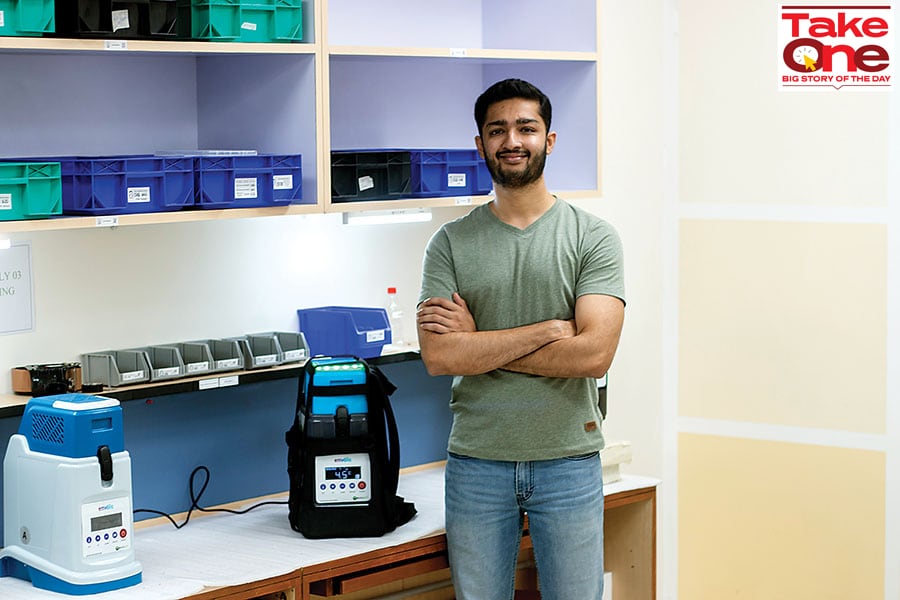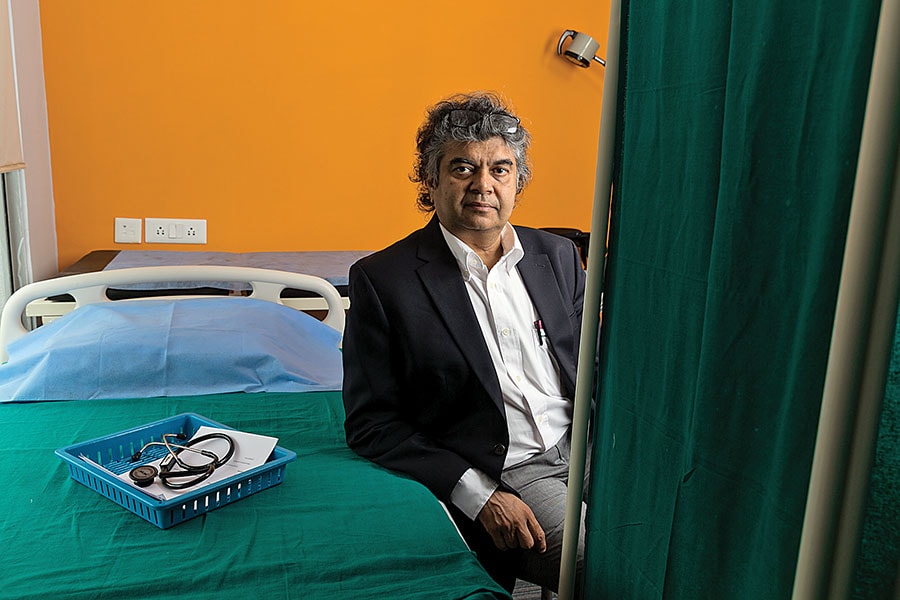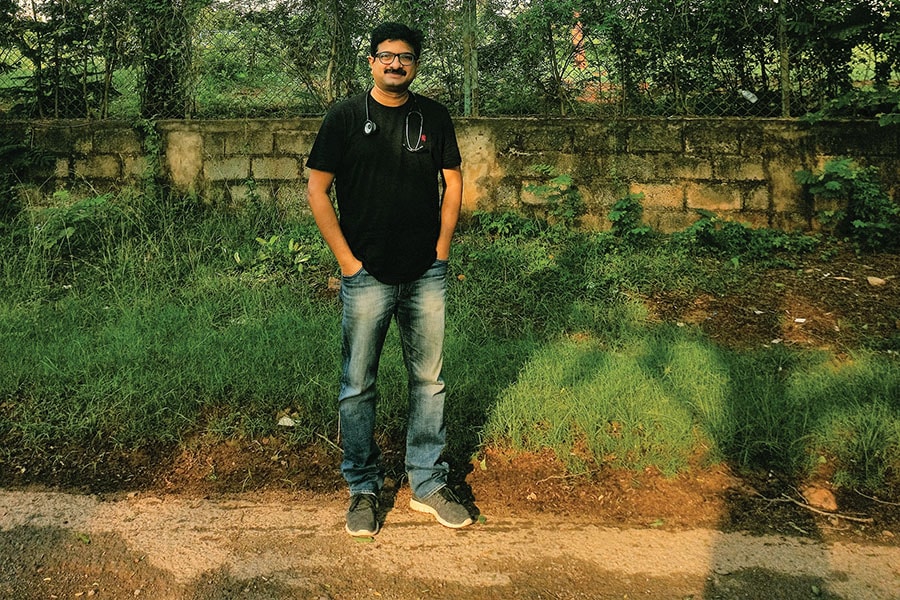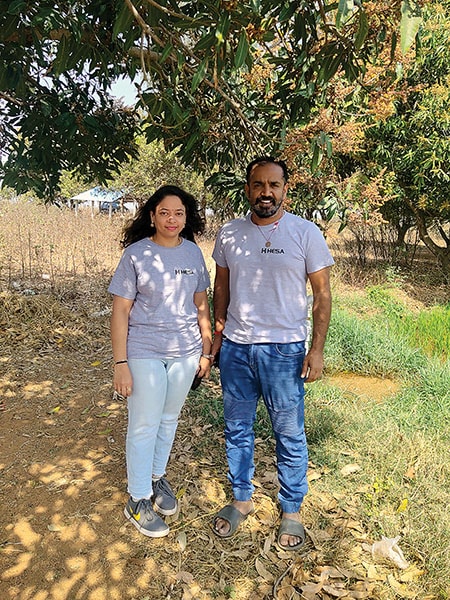About 120 km away from Imphal (Manipur) in Kamjong, M Zinghorla’s day, for the past few months, has been starting at dawn. A staff nurse at the Kamjong Community Health Center (CHC), she heads out to the centre to collect Covid-19 vaccines which she places carefully in a carrier. Then she sets off, sometimes in a vehicle, but on most days on foot, going door-to-door, immunising families in remote areas.While the first wave of the Covid-19 pandemic was limited largely to urban India, the second wave has severely hit rural India and the lack of health infrastructure has only become more evident. A recent report by SBI Research pointed out that between March and May 2021, the percentage of rural districts with Covid-19 cases across India surged from 36.8 to 48.5. And Like Zinghorla, there are a number of healthcare workers across the country, who have been struggling to treat patients due to the lack of infrastructure, availability of medication and now, lack of tests and vaccines in rural India.
Now, a handful of startups—for-profit and non-profit—are using various innovations or pivoting their models to help rural India fight Covid-19.
“Some of the areas we travel to are extremely remote, and often there aren’t decent roads, and electricity is always an issue. Earlier, this was a major issue for delivering vaccines because we had to carry large bulky ice-boxes," recalls Zinghorla.
Over the past few months, Zinghorla and her team have switched to Manipal-based Blackfrog Technologies’ Emvà³lio, a solar-powered vaccine carrier with an IoT device (to track the vaccine) that can be worn like a backpack. “With this new technology we can travel to remote areas and immunise entire communities easily," she says.
According to Ministry of Health and Welfare estimates, 25 percent of all vaccines (not just Covid-19) end up getting wasted due to temperature fluctuations. This is even more relevant in the current scenario since both Covaxin and Covishield vaccines need to be stored at a temperature between 2 and 8°C, and are freeze-sensitive—meaning storing them in ice-boxes is unsafe because the temperature often drops below 0 degrees. “Ice boxes usually end up freezing the vaccine, and one risks accidentally administering vaccines that have lost potency. Emvà³lio helps in reducing the economic burden of these vaccines and nullifies the chances of inefficacious vaccines being administered," says Mayur Shetty, CEO, Blackfrog Technologies.
Emvà³lio’s patented technology ensures that the contents in the cold chamber are blanketed in strictly temperature-controlled air. Blackfrog has a production capacity of 1,500 units per month and Emvà³lio is now being deployed in large volumes across North-East India under the National Health Mission.
While during the first wave, Blackfrog’s technology was useful—especially in urban India—in handling Covid-19 test samples, which due to a change in temperature might lead to false negatives, by November 2020, they launched a newer version focussing on vaccine delivery.
The company, which started in 2015 as an engineering design and consultancy firm, in 2017 transitioned into a product development company. In an attempt to solve the issues with immunisation—vaccines being wasted due to lack of temperature control—Shetty and his team developed the patented technology called Emvà³lio. “This product is a portable medical-grade refrigeration system for last-mile delivery of vaccines, blood cultures and all other biologicals," he says. The startup began with vaccines for polio, BCG and MMR, which also require 2-8 degrees Celcius refrigeration, and is funded by BIRAC and leading impact investors, including Venture Centre (NCL, Pune), CCAMP, Bengaluru, and Social Alpha.
While Blackfrog Technologies is solving an immunisation problem, Gurugram-based Gramin Health Care has now shifted its model from the brick-and-mortar primary health care clinic model—including diagnostic tests and pharmacy—to telemedicine and door-to-door delivery of medicines. “People stopped coming to clinics and doctors were reluctant to go to the clinics due to Covid-19. So it made sense for them to be in our polyclinic, which was well-sanitised, and provide telemedicine support from there," says Ajoy Khandheria, founder of Gramin Health Care.
![]() Gramin Health Care, founded by Ajoy Khandheria, offers teleconsultations and door-to-door delivery of medicines in rural areas
Gramin Health Care, founded by Ajoy Khandheria, offers teleconsultations and door-to-door delivery of medicines in rural areas
Image: Madhu Kapparath
In the last three months, the Gramin team has also set up a free 24x7 Covid-19 hotline, run by clinicians, nurses and doctors. Gramin currently works in close to 1,000 villages across Haryana, Bihar, UP, West Bengal, some parts of Maharashtra and Meghalaya.
In the current situation, Gramin also recognised that people might not be willing to travel to buy medicines. “Our pharmacy might be 15 km away from where they live... so they might prefer buying medicines from another pharmacy closer to where they are, which might be more expensive, fraudulent or may not be available," adds Khandheria. As a solution, Gramin has decided to set up 500 pharmacies for its 1,000 villages, which can also become their point of presence. “[In the pharmacies] we can provide medicines, the patient can do his/her telemedicine call with the doctor and, last, his blood samples can be collected there [if needed]. It becomes a centre for medical care." The process of setting these up has been slower due to Covid-19. In the next 45-60 days, they plan to go up to 100 and, in three to four months, to about 500 pharmacies.
Though Gramin’s team continues to reinvent based on the way the situation is changing, several challenges remain when it comes to Covid-19. “First, our healthcare workers [about 160] are not vaccinated. There is a severe lack of medicines and oxygen concentrators, and we should be provided with subsidised RT-PCR tests to accurately test patients," says Khandheria. Moreover, it has been hard to break the taboos surrounding Covid-19 in rural India. “When our clinicians are not attending to calls, they proactively call up patients to check on them. When they ask, ‘aapke ghar pe kisiko Covid hai (does anyone at your place have Covid?)’ people respond saying, ‘No, we don’t want to talk to you,’ and hang up. This can only be changed through patient education."
Currently, they get very few calls for Covid-19, despite having set up a hotline. Patients do call for other health issues via tele-consultation. “But for Covid-19, the effort is from our side. A free Covid-19 hotline, free resources... free everything but still no one wants to call," he says.
![]() Dr Satish S Jeevannavar co-founded AI Health Highway to help medical professionals triage patients remotely
Dr Satish S Jeevannavar co-founded AI Health Highway to help medical professionals triage patients remotely
Even as Gramin tries to improve healthcare in rural India, Indian Institute of Science (IISc)-incubated startup AI Health Highway has been trying to reduce the burden on hospitals by identifying high-risk groups who could be prone to the virus based on the demography. In March 2020, the Bengaluru-based startup developed a web-based app for Covid-19 self-screening in response to the pandemic. This Covid Pre-Screening and Triage Tool is a risk-assessment platform to identify low, mid and high-risk groups who could be prone to the disease based on the demography, travel/contact history and clinical presentation.
“We adapted the tool with a nurse-led model for Covid-19 as well as non-communicable diseases (NCDs) management for the rural population, which is not tech-savvy and cannot speak English. It now has 100 percent adoption and the rural population seamlessly connects with our nurse over IVR Helpline and still retains the human connect which is very critical for delivering last-mile access to healthcare," says Dr Satish S Jeevannavar who co-founded AI Health Highway along with Dr Radhakrishna Jamadagni in September 2019.
Essentially, since the rural population is not tech-savvy, a nurse proactively calls up a set of people and gets responses via telephone. Based on the age, demographics, travel, contact history and assessment of co-morbidities plus risk factors, the tool classifies the end-user as low (green), mid (orange) and high (red) risk for Covid-19.
When the above process is followed diligently on days 0, 3, 7, 14 and 28, it helps in identifying and stratifying population clusters as green (safe, no action needed) orange (wait and watch/stay at home) and red (go and consult/visit nearby doctor/clinic). The “digital surveillance" process is similar to the “door-to-door campaigns that are done by ASHA workers for surveillance and contact tracing," points out Dr Jeevannavar.
After launching the first version of the Covid-19 Screening and Triage tool in March last year, they pivoted the product to address factory workers and the rural population by June 2020. Subsequently, they hired nurses, doctors and further developed the analytics and surveillance.
“We found a use case with factory workers in rural India, tier 2/3 towns–they could not visit their regular clinics or hospitals as they were all overburdened with Covid-19 care, they could not access apps or digital health solutions as they were not tech-savvy and probably did not use smartphones, and last, they were deprived of existing health awareness campaigns as they were not part of the English-speaking population (most initiatives such as screening, risk assessment, vaccination registration etc, are all rolled out first in English)," says Dr Jeevannavar.
During the first three months of running the Covid-19 screening programme, the startup realised that a bigger problem in rural areas was the neglect of non-communicable diseases (NCDs) like uncontrolled diabetes, hypertension, chronic heart and lung ailments due to missed medications and lack of tests and follow-ups, which in turn again put people at a high risk of Covid-19. Through their telehealth intervention, the startup was able to do proactive Covid screening and manage the NCDs as well. The tool is currently deployed in the rural areas of Karnataka, Tamil Nadu and Gujarat and has been used to carry out more than 7500 Covid-19 screenings and over 5000 teleconsults, overall impacting more than 5000 families across India.
![]() Hesa, a last-mile digital marketplace, was launched by Hema and Vamsi Udayagiri during the lockdown last year to fill in for the disruption of supply chains in rural areas
Hesa, a last-mile digital marketplace, was launched by Hema and Vamsi Udayagiri during the lockdown last year to fill in for the disruption of supply chains in rural areas
Last year, when the nationwide lockdown was announced and supply chains were disrupted, rural customers bore the brunt as their kirana stores were emptied. Telangana-based startup Hesa, which commenced operations in April 2020, came to the rescue. This last-mile digital rural marketplace connects rural entrepreneurs with suppliers as well as buyers and also functions as a platform where rural consumers can buy services such as insurance and do bank transactions.
Hesa not only helped aggregate grocery supplies and got them delivered to villages but also provided forward market linkages to farmers by directly procuring produce and reselling it. Over the past few months, the agri vertical has facilitated this for a wide range of produce like onions, gingers, potatoes, paddy, dealing with almost 100 to 120 metric tonnes per day.
“Before launching we had been doing ground research in rural India for a long time so this understanding of the rural customers and our digital platform that had already been tested and piloted enabled us to jump right in to address the woes of the rural population. Soon we were onboarding village level entrepreneurs and businesses were using our network to reach the remotest corners to offer their products, services for buying, selling and also fulfilling their social obligations," says Vamsi Udayagiri, founder and CEO of Hesa.
From providing medical and ration kits to enabling livelihoods, Hesa has been working with the rural communities and other stakeholders to lend support. They have impacted 20,000 people directly and plan to reach 100,000 people over the next two months. They also recently launched the #SavingLivelihoods initiative to provide employment opportunities for those who lost their means of livelihood amid the pandemic. In a short time, they have onboarded 300 people, a majority of them being those who reverse migrated from cities due to loss of employment.
“We closed the year with `30.12 crore as gross revenue. We have been consistently growing at 15 percent every month and have a 65 percent retention rate. Over 40 brands are riding the Hesa platform and more than 6 lakh rural customers have been catered to," says Udayagiri. Hesa is currently present in over 6,000 villages across Andhra Pradesh, Telangana, Karnataka and Maharashtra. “Rural livelihoods of more than 7,000 ‘Hesaathis’ (village level micro entrepreneurs) where over 30 percent are women have been powered by us in the last one year," she adds.
The startup has also been providing assistance for vaccine registration. So far, 3,500 people have been registered with the help of the Hesaathis. “There is a plan to further support this through awareness campaigns in order to address vaccine hesitancy," Udayagiri adds.
Meanwhile, startup Strawcture Eco, in a bid to help the rural population, decided to ramp up the heath infrastructure itself. Founder of Strawcture Eco, 29-year-old Shriti Pandey, an entrepreneur and a civil engineer, set up a Covid-19 hospital in rural India in under 80 days. Along with her team and the residents of the village, she built Vistex Hospital in Masahri Block, Patna, for Doctors For You, a Delhi-based NGO, along with Selco Foundation, using agri bio panels, a sustainable material manufactured by her startup. “It took a village, quite literally, to build this hospital," she says.
The team knew they had to work quickly, and kept things ready off site. The fact that they used agri bio panels—made with stubble, a replacement for bricks—also helped build faster. “With hollow steel frames as an alternate to concrete, there is no drying period of 20 days, you can keep building. Similarly our panels are 13ft by 6ft versus a brick that is 10cm by 10 cm in size. The carpenters can work a lot faster with big panels. We would have put up a wall area of 40,000 sq feet in close to two to three weeks," says Pandey.
It was not a day too soon. “The day we finished, the very next day patients started coming. It was like they wanted the hospital built yesterday. In that entire 100 km stretch from Patna to the village, this was the first hospital that was built," she says. The hospital can accommodate close to 100 beds and has about 11-12 doctors.
With the situation getting dire in rural India, Doctors For You—the organisation running the hospital—has reached out to Pandey’s team to set up another 100-bed hall. In January, Strawcture also took up another project for Batra Hospital in Jalandhar. They were expanding their healthcare facilities to build a 6,000-sq ft additional space to have more departments and specialisations. Pandey’s team set up the space in a month’s time and, with the situation worsening, it has been converted into a Covid-19 hospital.
Pandey and her team have also sent out proposals to various governments, including Uttar Pradesh, for projects. “The solutions we have offered this time will include proposals wherein these structures [hospitals] can be dismantled and using the same material, you can make smaller Primary Health Care centres post the Covid-19 crisis," says Pandey.
From lack of access to healthcare facilities, specialists, affordability and quality to poor tech or digital adoption, the healthcare infrastructure in rural India has many challenges. Though technology is available and accessible in urban settings, “in rural areas, the challenge is adoption and continuity of use", says Kshama Kothari, clinical director, Healthcare Innovations, Social Alpha. “We have seen many examples of successful pilots but few commercial and long-term adoptions by commercial purchase. At rural centres, digital work flows are either primitive or absent. We need strong leaders to incentivise technological upgradation."
There’s clearly a lot more that can be done. According to Sridhar Vembu, the founder and CEO of Zoho Corporation—who moved to a village in South India just before the pandemic hit—startups can help rural India by quickly putting together technology to enable frontline workers, volunteers, NGOs and the government to streamline relief work. “We also need mobile clinics that are staffed with trained healthcare professionals that visit every village on a weekly basis and spend one or two hours in a particular location. A simple app that lets you know the exact time of arrival of the mobile clinic in a village and allows you to book an appointment will be quite useful. We can link health records to biometrics of the patient and enable access to them from the mobile clinic. This will allow the healthcare workers to track the treatment status and medical history."
Gramin Health’s Khandheria adds, “If you could provide adequate health care, to people within a kilometre of where they live, they will take advantage of it. If they take advantage of it, we will be able to prevent many serious cases."

 Mayur Shetty, CEO of Blackfrog Technologies, which has designed a solar-powered vaccine carrier with a tracking device
Mayur Shetty, CEO of Blackfrog Technologies, which has designed a solar-powered vaccine carrier with a tracking device
 Dr Satish S Jeevannavar co-founded AI Health Highway to help medical professionals triage patients remotely
Dr Satish S Jeevannavar co-founded AI Health Highway to help medical professionals triage patients remotely Hesa, a last-mile digital marketplace, was launched by Hema and Vamsi Udayagiri during the lockdown last year to fill in for the disruption of supply chains in rural areas
Hesa, a last-mile digital marketplace, was launched by Hema and Vamsi Udayagiri during the lockdown last year to fill in for the disruption of supply chains in rural areas